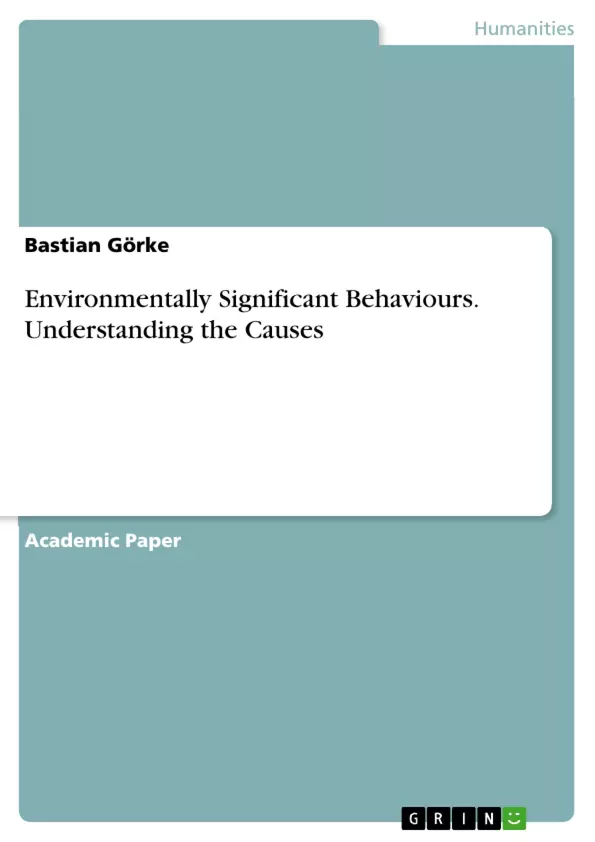Investigating the causes of environmentally significant human behaviour, environmental psychology is a fairly new multidisciplinary science.
Amongst others it has evolved from social psychology and has advanced to an integral approach of understanding individuals’ behaviour that directly or indirectly, noticed or unnoticed affects the natural environment and the dynamics of ecosystems.
To overcome the gap of knowledge why people behave like they actually do, psychologists have drawn up models and theories
Inhaltsverzeichnis (Table of Contents)
- Investigating the causes of environmentally significant human behaviour
- Understanding the causes of behaviour and systemising the variables
- Extending the scope of this essay
Zielsetzung und Themenschwerpunkte (Objectives and Key Themes)
This assignment investigates the causes of environmentally significant human behaviour and explores the role of environmental psychology in understanding and potentially influencing such behaviour. The primary objective is to examine the interplay of psychological and contextual factors that drive individual choices with environmental implications.
- The significance of environmentally significant behaviour, even on a personal level, in contributing to larger environmental impacts.
- The role of psychological theories, such as the Theory of Planned Behaviour, the Theory of Interpersonal Behaviour, and the Value-Belief-Norm (VBN) theory, in explaining environmentally significant behaviour.
- The importance of contextual factors, such as accessibility, availability of resources, knowledge, and financial limitations, in shaping environmentally significant behaviour.
- The interplay of personal and contextual factors in influencing behaviour, as articulated by the ABC-Theory.
- The impact of personal capabilities, such as fitness and knowledge, on the decision process for environmentally significant behaviours.
Zusammenfassung der Kapitel (Chapter Summaries)
The assignment begins by introducing environmental psychology as a multidisciplinary field focused on understanding human behaviour's environmental impact. It then presents a selection of key psychological theories that address the causes of environmentally significant behaviour, including the Theory of Planned Behaviour, the Theory of Interpersonal Behaviour, and the Value-Belief-Norm theory. The assignment emphasizes the importance of a multi-cause holistic view that considers both psychological and contextual factors influencing behaviour. The ABC-Theory is introduced to highlight the interplay of personal and contextual influences, with the latter becoming increasingly dominant as they become either supportive or obstructive to pro-environmental behaviour.
The assignment then delves into three examples of environmentally significant behaviours, highlighting the roles of psychological and contextual factors in each case. The first example, commuting by bicycle instead of driving, illustrates how personal values, contextual conditions, and personal capabilities can influence environmentally positive choices. The second example, purchasing a bio-fuel powered car, explores the impact of emerging technologies, knowledge, and financial barriers on the decision process. Finally, the third example, using electrical heating, examines the potential for egoistic motivations, the influence of knowledge and financial constraints, and the influence of habitual behaviour on environmentally negative choices.
Schlüsselwörter (Keywords)
Key terms and concepts explored in this assignment include: environmental psychology, environmentally significant behaviour, Theory of Planned Behaviour, Theory of Interpersonal Behaviour, Value-Belief-Norm theory, ABC-Theory, contextual factors, personal capabilities, emerging technologies, knowledge barriers, financial barriers, habitual behaviour, and egoistic motivations.
Frequently Asked Questions
What is environmental psychology?
Environmental psychology is a multidisciplinary science that investigates the causes of human behavior and its direct or indirect effects on the natural environment and ecosystems.
What is the ABC-Theory in environmental behavior?
The ABC-Theory highlights the interplay between personal 'Attitudes', 'Behavior', and 'Contextual' factors. It suggests that context can either support or obstruct pro-environmental actions.
Which theories explain why people act environmentally?
Key models include the Theory of Planned Behaviour, the Theory of Interpersonal Behaviour, and the Value-Belief-Norm (VBN) theory.
What are "contextual factors" in this context?
Contextual factors include the availability of resources, financial limitations, infrastructure (e.g., bike lanes), and access to knowledge or technology.
How do personal capabilities influence environmental choices?
Factors like physical fitness (for cycling) or specialized knowledge (about bio-fuels) significantly impact an individual's decision-making process for environmentally significant behaviors.
- Arbeit zitieren
- Bastian Görke (Autor:in), 2006, Environmentally Significant Behaviours. Understanding the Causes, München, GRIN Verlag, https://www.grin.com/document/1030689



